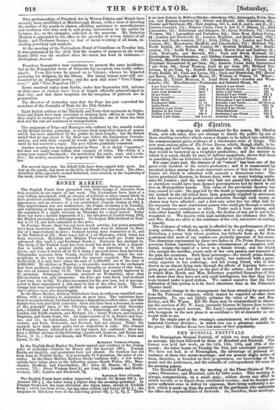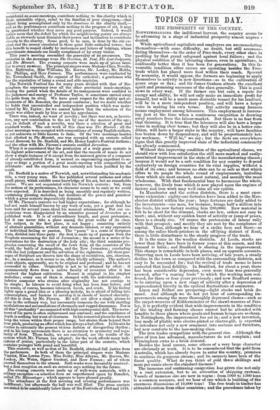THE MUSICAL FESTIVALS.
The Birmingham Musical Festival, of which we have already given an account, has been followed by those of Hereford and Norwich. The former was held last week, on the 14th, 15th, 16th, and 17th of the month ; the latter began on Tuesday the 21st, and concluded yesterday.. We have not had, as at Birmingham, the advantage of personal at- tendance at these two musio-meetings; and our present slight notice of them, therefore, is founded on their programmes, our knowledge of the music and the performers, and the remarks of correspondents for some of the morning papers. The Hereford Festival, or the meeting of the Three Choirs of Wor- cester, Gloucester, and Hereford, calls for little notice. This meeting is always, comparatively, on a small scale - seldom shows any effort to obtain novelty or to depart from established routine ; and its receipts are never sufficient even to defray its expenses, there being uniformly a de- ficit, which is made up from the pockets of the gentlemen who undertake the office and responsibilities of stewards. As, therefore, these meetings,
considered as meele-meetings, contribute nothing to the charity which is their ostensible object, relief to the families of poor clergymen,—that object being accomplished only by the donations to the charity itself,— and as the performances contribute nothing to the progress of art, it may be questioned whether they serve any good purpose. Indeed, it would rather seem that the deficit for which the neighbouring gentry are always liable as stewards must diminish their power and inclination to contribute directly to the charity. Some good, to be sure, is done by the stir ex- cited and the money circulated in those quiet little cathedral towns; but this benefit is reaped chiefly by innkeepers and letters of lodgings, whose extortionate demands are loudly complained of by every visitor. This year's meeting resembled the generality of its precursors. The oratorios in the mornings were The Creation, 49t. Pate, The Last Judgment, and The Messiah. The evening concerts were made up of pieces fami- liar to every amateur. The principaleingers were Madame Clara Novelle, Mrs. Endersohn, Miss Williams, Mr. Reeves, Mr. Lockey, Mr. Hobbs, Mr. Phillips, and Herr Formes. The performances were conducted by Mr. Townshend Smith, the organist of the cathedral; a gentleman who has the reputation of being a sound and able musician.
The Norwich Festival has for many years divided with that of Bir- mingham the supremacy over all the other provincial music-meetings. During the period when the details of its management were confided to the judgment and energy of Professor Taylor, it sometimes carried away the palm from its rivaL We have great respect for the ability and at- tainments of Mr. Benedict, the present conductor ; but we doubt whether he holds that uncontrolled and independent position which was main- tained by Mr. Taylor; for we cannot believe that the selection of the music was either made by him or met his approbation.
There was, indeed, no want of novelty; but there was not, as hereto- fore, any new contribution to the art by one of the masters of the age ; nor, in default of such a novelty, was there a selection of great and standard works. The sole work of this class was The Messiah : all the other mornings were occupied with compositions of young English authors, as yet unknown or little known to fame. Of the two mornings besides that allotted to The Messiah, one was occupied with an oratorio called Israel Restored, by Dr. Bexfield, and Mr. Henry Leslie's Festival Anthem ; and the other with Mr. Pierson's oratorio entitled Jerusalem.
When it is considered that the production of a truly great oratorio is the highest achievement of the art, and that the records of music do not show a single instance of it except from the matured genius of a composer of already-established fame, it seemed an unpromising expedient to oc- cupy so large a portion of a great music-meeting with compositions of debutants and the experiment has certainly not been justified by the result.
Dr. Bexfield is a native of Norwich, and, notwithstanding his academic title, a very young man. He has published several anthems and other small pieces, which exhibit some knowledge of his art, but no remarkable genius. We are not acquainted with his Norwich oratorio ; but, from the notices of its performance, its character seems to be such as we could have expected. It is described as being smoothly and regularly written, containing pleasing melodies, but destitute of the power and grandeur which a great oratorio imperatively demands. Of Mr. Pierson's oratorio we had higher expectations; for although he had not made himself known by any work of note, yet a great deal has been said for several years about his musical attainments. But our ex- pectations were disappointed by an attentive perusal of Jerusalem as a published work. It is of extraordinary length, and great pretension; but it can never take a place among the great works of its class. The subject, in the first place, is not happy ; consisting entirely of abstract generalities, without any dramatic interest, or any expression of individual feeling or passion. The "poem" is a cento of Scripture texts, divided into three parts : the first is made up of passages from the Prophets announcing the fall of Jerusalem ; the second is a series of la- mentations for-the destruction of the holy city; the third contains pro- phecies concerning the recall of the Jews from all the countries of the world, the battle of Armageddon, and the New Jerusalem; concluding with the last judgment and the salvation of the righteous. All these pas- sages of Scripture are thrown into the shape of recitatives, airs, choruses, &c., in a manner, as it seems to us, often wholly arbitrary. The author's great objects, apparently, are to be original and profound ; and he has not succeeded in either. Originality is not to be attained by effort : it spontaneously flows from a native faculty of invention after it has received the highest cultivation. Mozart is original in his simplest melodies ; every one of them is stamped with his individuality. An inferior composer who strains after originality has not courage to be simple ; he labours to avoid doing what has been done before, and his music, of course, becomes laboured, harsh, and crude, If his feeling lights upon a grand idea or a pleasing melody, he is afraid of falling into commonplace, and hastens to envelop it in clouds of learned obscurity. All this is done by Mr. Pierson. He will not allow a single phrase to close in the ordinary way, but incessantly torments the ear with startling modulations and accumulations of chromatic and rugged dissonance. Nor is all this "profundity" accompanied with high contrapuntal skill. The move- ment of his parts is often embarrassed and confused; and the semblance of depth is nothing but want of clearness. In his concerted pieces he does not keep the voices within their proper range, but strains them beyond their true pitch, producing an effort which has always a bad effect. In his airs he curies to extremity the present vicious fashion of disregarding rhythm ; and in his large movements there is no attention to symmetry and regu- larity of form. These faults, we are convinced, are the results of the system which Mr. Pierson has adopted ; for the work affords many indi- cations of genius, particularly in the latter part of the oratorio, which contains passages both grand and beautiful. This oratorio, as well as that of Dr. Bexfield, obtained full justice from the performers. In both of them the principal singers were Madame Viardot, Miss Louisa Pyne, Miss Dolby, Miss Alleyne, Mr. Reeves, Mr. Lackey, Mr. Weiss, Signor Gardoni, and Herr Formes ; all of whom exerted themselves to the utmost. Both works were favourably received: but a first reception on such an occasion says nothing for the future.
The evening concerts were made up of well-worn materials, with a solitary exception—a selection from an unperformed opera by Benedict, called The Minnesinger; which appears to have pleased greatly. The attendance at the first morning and evening performances was indifferent; but afterwards the hail was well filled. The gross receipts are stated to be considerably below those of thaFestivals of 1845 and 1848.



























 Previous page
Previous page